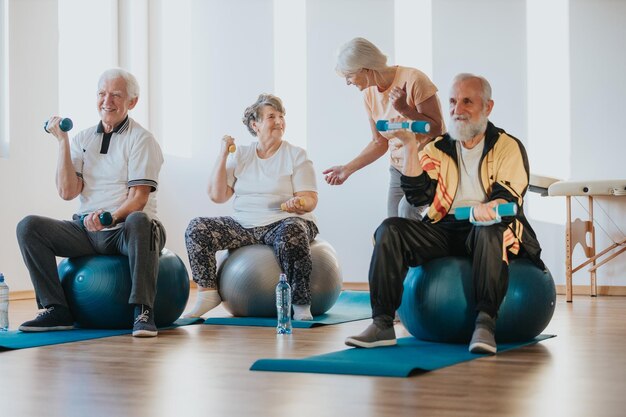Current research about the great benefits of training with weights and resistance exercises.


Strength training in older age is a dynamic and becoming increasing popular, with ongoing research shedding light on its numerous benefits for people as they age. Engaging in regular strength and resistance training has been shown to enhance muscle mass, bone density, and overall functional capacity in older individuals.
Read on further to look into some of the key findings from recent studies.
A study published in the Journal of Aging and Physical Activity (2021) conducted by Smith et al. examined the impact of resistance training on muscle strength and physical function in older adults. The results demonstrated a significant improvement in both upper and lower body strength, suggesting that tailored resistance programs can effectively enhance muscular performance in older individuals.
Moreover, research by Peterson et al. (Journal of the American Geriatrics Society, 2020) explored the effects of strength training on bone health in aging populations. The study highlighted that resistance exercises contribute to increased bone mineral density, which is crucial for preventing fractures and maintaining overall skeletal integrity in older adults.
Another area of interest is the role of strength training in mitigating the risk of chronic conditions. A comprehensive review by Jones et al. (British Journal of Sports Medicine, 2019) synthesized evidence from multiple studies and found that regular resistance training is associated with a reduced risk of chronic diseases such as cardiovascular issues, diabetes, and osteoporosis in older individuals.
Importantly, a study by Liu-Ambrose et al. (Journal of the American Geriatrics Society, 2018) explored the cognitive benefits of strength training in seniors. Their findings suggested that participating in resistance exercises positively influenced cognitive function, indicating a potential link between physical strength and cognitive health in aging populations.
Furthermore, a research by Chang et al. (Sports Medicine, 2020) delved into the impact of strength training on mental well-being among older adults. The analysis revealed that engaging in regular resistance exercises is associated with improved mental health outcomes, including reduced symptoms of anxiety and depression.
As we consider the practical implications of this research, it’s essential to emphasise the importance of individualised and well-monitored strength training programs for older adults. Tailoring exercises to meet the unique needs and abilities of each person ensures both safety and effectiveness. Consult with your Osteopath before undertaking new activities t make sure you are at the appropriate stage in your and recovery to undertake the new regime.
In conclusion, current research on strength training in older age has numerous benefits, ranging from enhanced muscle strength and bone density to positive effects on cognitive and mental well-being. These findings advocate for the incorporation of tailored resistance programs into the lives of older individuals, promoting not only physical health but also overall quality of life.
Its all good news, so there is no stopping you.
Always consult with healthcare professionals before starting any exercise regimen, and consider seeking guidance from qualified trainers experienced in working with older populations.
